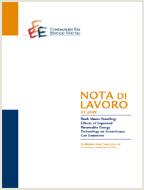Access to Short-term Credit and Consumption Smoothing within the Paycycle

25.01.2016
D14, D18, G23
Consumption Behavior, Short-term Credit
Economic Theory and Applications
Carlo Carraro
I study the effect of access to payday loans on the timing, level and composition of consumption. Using a newly obtained military administrative dataset of sales at on-base grocery and department stores, I examine how consumption behavior changes after the passage of a federal law that effectively bans military personnel from accessing payday loans in some states but not others. The military setting is ideal for this analysis because military personnel are assigned to locations across the United States with varying degrees of access to payday loans. Furthermore, since military personnel face varying known wait times between paycheck receipts throughout the year, I can examine daily consumption patterns in ways that were infeasible with previous datasets and surveys. I first present evidence that food expenditures spike on payday and are significantly lower at the end of a pay period; the fact that these patterns hold for perishable goods like produce indicates that food consumption is also not smooth, even over a two-week period. Then using a difference-in-difference framework, I find that payday loan access enables consumers to better smooth their consumption between paychecks, with no detectable effect on the level of food consumption. These patterns imply that payday loans enable liquidity-constrained individuals to smooth their consumption. However, I also find suggestive evidence that they lead to temptation purchases. Military personnel purchase more alcohol and electronics when given access to payday loans. Further evidence suggests that there may be significant heterogeneity in the population, with indications of present-biased preferences among some individuals and forward-looking, self controlled behavior among others.
***
Suggested citation: Zaki, M., (2016), ‘Access to Short-term Credit and Consumption Smoothing within the Paycycle’, Nota di Lavoro 7.2016, Milan, Italy: Fondazione Eni Enrico Mattei
